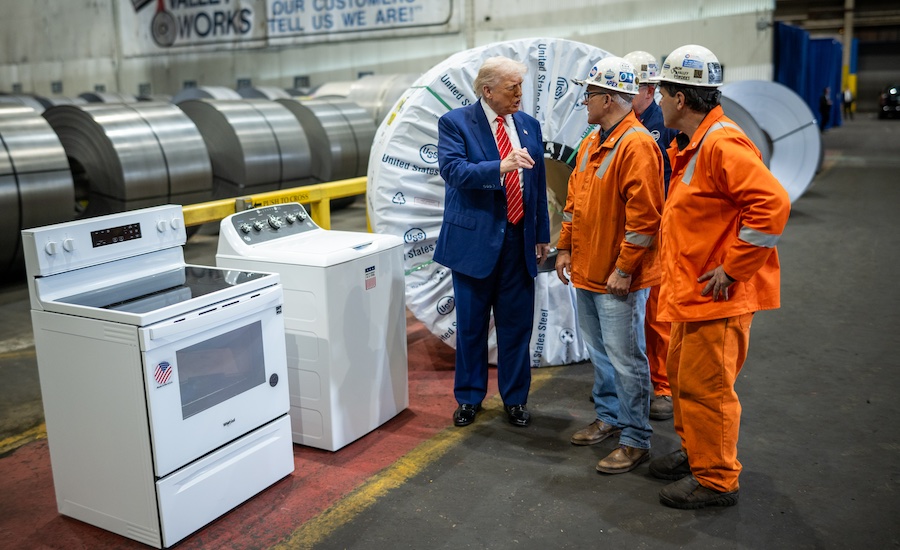President Donald Trump meets with steelworkers at the Irvin Works in West Mifflin, Pa., before his remarks there May 29.
Photo Courtesy of the White House
President Donald Trump said May 29 that U.S. Steel will keep its headquarters in Pittsburgh as part of what he, in early May, called a “planned partnership” between U.S. Steel and Japan-based Nippon Steel, which would acquire the steelmaker in a $15-billion revised deal that Trump had previously opposed before signing off on changes to the outright purchase both companies had pursued for the last year.
In an appearance at U.S. Steel’s Irvin Works in West Mifflin, Pa., Trump also said that he would increase Section 232 tariffs on aluminum and steel from China from 25% to 50%.
Nippon Steel clarified that under the deal—which President Joe Biden rejected last year but left open for a successor to approve—U.S. Steel would retain its name, stay in Pittsburgh and have what Trump and Senator David McCormick (R-Pa.) said would be a majority U.S.-citizen board of directors. As public pressure against the deal mounted, Nippon Steel also previously committed to invest substantially in upgrading U.S.-based capacity—including new production in western Pennsylvania, Arkansas and Alabama—and promised to not offshore U.S. production. Trump said in his remarks that U.S. Steel would maintain all of its current operating blast furnaces at full capacity for a minimum of 10 years under the deal.
McCormick described the deal as a “golden share” arrangement to reporters, including in an interview on CNBC’s Squawk Box. The deal would have to be approved by June 18. Golden share transactions have never been undertaken before by the U.S. government as part of a deal with a foreign company. Golden share arrangements have been used by the U.K., Brazil and China to grant the government veto power over the decisions of a company partially owned by the government, often following privatization or significant public investment.
A similar arrangement was used for the 2009 government bailout of U.S.-based automotive companies General Motors and Chrysler during the Obama administration, although those investments were considered loans that had to be repaid and no foreign ownership was involved in the loans themselves. General Motors emerged from bankruptcy as a new company majority-owned by the U.S. Treasury Dept, and has since paid back its loan, and Chrysler emerged owned primarily by the United Auto Workers and Italian automaker Fiat S.p.A. Chrysler is now owned by Stellantis. There does not seem to be any indication that the Treasury Dept. would take an ownership stake in U.S. Steel in this current deal.
The White House has not publicized the text of the deal nor posted a fact sheet about it, nor has Nippon Steel and U.S. Steel shared more than general details. But analysts expect that a golden share arrangement would likely give the U.S. government direct control over a certain number of U.S. Steel’s board seats.
“I have to approve the final deal with Nippon and we haven’t seen that final deal yet,” Trump told reporters outside Air Force One following the Irvin Works event last week. “But they’ve made a very big commitment, and it’s a very big investment.”
The American Iron and Steel Institute, which represents U.S.-based steel manufacturers, applauded the administration’s increased tariff announcement and said they would help prevent more surges of Chinese exports to the U.S. The institute noted that Chinese steel exports have doubled since 2020 to 118 million tons at the end of 2024.
“AISI welcomes President Trump’s announcement today that he is increasing steel tariffs to 50%. Led by China, global steel overcapacity and production continues to grow, even as overall global steel demand is being impacted by the sharp downturn in the Chinese construction sector,” said Kevin Dempsey, president and CEO of the AISI.
The United Steelworkers of America oppose the deal with Nippon Steel but its locals in the Pittsburgh area support it as keeping jobs in the Mon Valley. Wolfe Research Analyst Timna Tanners said in a note to investors that Wolfe believes the deal will ultimately get approved.
“The takeover attempt has dragged on for 17 months,” the note said. “The union recently reiterated its opposition to the deal, but we don’t believe it can actually stop it.”
ENR Associate Technology, Equipment and Products Editor Jeff Yoders has been writing about design and construction innovations for 20 years. He is a five-time Jesse H. Neal award winner and multiple ASBPE winner for his tech coverage. Jeff previously wrote about construction technology for Structural Engineer, CE News and Building Design + Construction. He also wrote about materials prices, construction procurement and estimation for MetalMiner.com. He lives in Chicago, the birthplace of the skyscraper, where the pace of innovation never leaves him without a story to chase.

